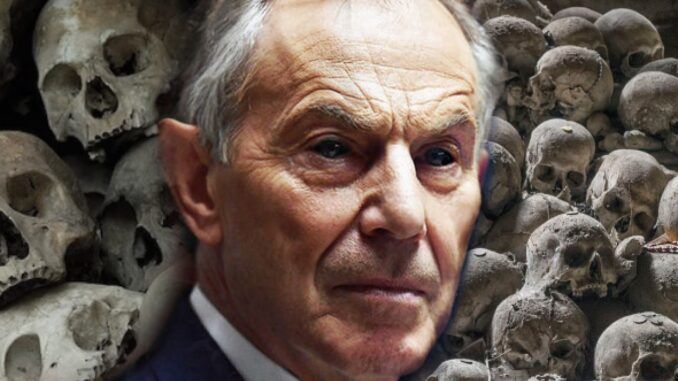
A book written by Tony Blair’s political agent John Burton, due to be published this week, reveals that the ex UK Prime Minister’s religion played a big part in his decision to go to war in Iraq.
Mr Burton, often described as Mr Blair’s mentor, says that Blair’s religion gave him a “total belief in what’s right and what’s wrong”, leading him to see the so-called War on Terror as “a moral cause”.
The Telegraph reports:

BYPASS THE CENSORS
Sign up to get unfiltered news delivered straight to your inbox.
You can unsubscribe any time. By subscribing you agree to our Terms of Use
The former Prime Minister’s faith is claimed to have influenced all his key policy decisions and to have given him an unshakeable conviction that he was right.
John Burton, Mr Blair’s political agent in his Sedgefield constituency for 24 years, says that Labour’s most successful ever leader – in terms of elections won – was driven by the belief that “good should triumph over evil”.
“It’s very simple to explain the idea of Blair the Warrior,” he says. “It was part of Tony living out his faith.”
Mr Blair has previously admitted that he was influenced by his Christian faith, but Mr Burton reveals for the first time the strength of his religious zeal.
Mr Burton makes the comments in a book he has written, and which is published this week, called “We Don’t Do God”.
In it he portrays a prime minister determined to follow a Christian agenda despite attempts to silence him from talking about his faith.
“While he was at Number 10, Tony was virtually gagged on the whole question of religion,” says Mr Burton.
“Alastair [Campbell] was convinced it would get him into trouble with the voters.
“But Tony’s Christian faith is part of him, down to his cotton socks. He believed strongly at the time, that intervention in Kosovo, Sierra Leone – Iraq too – was all part of the Christian battle; good should triumph over evil, making lives better.”
Mr Burton, who was often described as Mr Blair’s mentor, says that his religion gave him a “total belief in what’s right and what’s wrong”, leading him to see the so-called War on Terror as “a moral cause”.
“I truly believe that his Christianity affected his policy-making on just about everything from aid to Africa, education, poverty, world debt and intervening in other countries when he thought it was right to do it.
“The fervour was part of him and it comes back to it being Christian fervour that spurred him into action for better or worse.”
Mr Burton says that inherent in Mr Blair’s faith was the belief that people should be treated fairly: “He applied that same principle in everything he did – from establishing the Social Exclusion Unit to ethnic cleansing in Kosovo, and ridding Iraq of the evils of Saddam Hussein’s rule.”
The comments will add to the suspicions of Mr Blair’s critics, who fear he saw the Iraq war in a similar light to former US President George W Bush, who used religious rhetoric in talking about the conflict, as well as the war in Afghanistan, describing them as “a crusade”.
Last week, Donald Rumsfeld, the former US defence secretary, was accused of sending the Mr Bush memos during the Iraq war that featured quotes from the Bible alongside images of American soldiers.
Anti-war campaigners criticised remarks Mr Blair made in 2006, suggesting that the decision to go to war in Iraq would ultimately be judged by God.
Mr Blair was not worried by people questioning his decisions, Mr Burton says, but was “genuinely shocked if they questioned his morality because there was never a dividing line between his politics and Christianity”.
Although key advisers such as Mr Campbell tried to stop him talking about his faith while prime minister – famously declaring “we don’t go God” – Mr Burton says that he was nevertheless determined to fight secularism.
Mr Burton, who coauthored the book with Eileen McCabe, a journalist, said Mr Blair wanted to “buffet the secular society that dominated life in Britain” and thought it was “time to nudge it in the other direction”.
Tony Blair complained in 2007 that he had been unable to talk about his faith while in office as he would have been perceived as “a nutter”.
“It’s difficult if you talk about religious faith in our political system,” he said. “If you are in the American political system or others then you can talk about religious faith and people say ‘yes, that’s fair enough’ and it is something they respond to quite naturally. You talk about it in our system and, frankly, people do think you’re a nutter.”
Since leaving Downing Street, he has set up the Tony Blair Faith Foundation and given a number of interviews about his faith.
Last month, he challenged the attitudes of the Pope on homosexuality, and argued that it is time for him to “rethink” his views.


